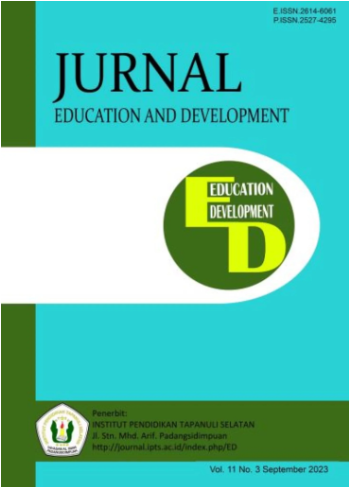TEACHERS PERCEPTION IN USING CHAT-GPT TECHNOLOGY TOWARD TEACHING ACTIVITIES
Main Article Content
Abstract
The aim of this study is to know the benefits and teachers perceptions of using Chat-GPT Technology toward teaching activities. It is to describe the teachers perception of using Chat-GPT technology toward teachers activities in class with the students. The data was collected through a interview and questionnare. Furthermore, the subject in this research was teachers in the Language Education Study Program in Teacher Training and Education Faculty in Universitas Islamic of Kadiri. The respondents were 3 teachers in the English Education Department Teacher Training And Education Faculty Kadiri Islamic University who are actively involved in teaching activities. Collecting data from interviews and questionnaires served as the first step in the data analysis process. According to the research findings, teachers expressed satisfaction with Chat-GPT's ability and accuracy of responses, ease of use, benefits, and improvement of knowledge. They also expressed satisfaction with Chat-GPT's ability to increase efficiency and effectiveness of time and improve learning activities. The teachers feedback following their experience with ChatGPT provides insights into the determinants that impact their willingness to include AI-driven digital resources for individualized instruction inside the English language educational setting. An essential determinant is the substantiation of efficacy, specifically in relation to personalized education and enhanced student results. the teachers observed the concrete advantages of ChatGPT's customized tasks, such as a reduction in grammatical mistakes,and the tool's ability to accommodate teacher searching material. In this research, a lot of information is given about how and what university teachers think about ChatGPT. Administrators and teachers at universities need to think about the advantages and disadvantages of using ChatGPT technology in higher education and find ways to balance them out so that the technology is still useful.
Article Details

This work is licensed under a Creative Commons Attribution-NonCommercial-ShareAlike 4.0 International License.
References
Ahmad, M. F., & Ghapar, W. R. G. W. A. (2019). The Era of Artificial Intelligence in Malaysian Higher Education: Impact and Challenges in Tangible Mixed-Reality Learning System toward Self Exploration Education (SEE). Procedia Computer Science, 163, 2–10. https://doi.org/10.1016/j.procs.2019.12.079
Cousins, J. (2023, February 10). What is Chat GPT? Why is it here to stay? — TFN. Tech Funding News. https://techfundingnews.com/what-is-chat-gpt-why-is-it-here-to-stay/
Cooper, D. R., & Schindler, P. (2014). Business Research Methods. McGraw-Hill.
Fakhriyyah A., et.al., (2023). Psikolinguistik, Neurolinguistik, dan Metafora Kognitif Komputer dalam Perkembangan Bahasa Teknologi Kecerdasan Buatan. Ghancaran: Jurnal Pendidikan Bahasa dan Sastra Indonesia Special Edition Lalonget IV, 110-121
Firat, M. (2023). What ChatGPT means for universities: Perceptions of scholars and students. Journal of Applied Learning & Teaching, 6(1), 57–63. https://doi.org/10.37074/jalt.2023.6.1.22
Ruby, D. (2023, February 8). ChatGPT Statistics for 2023: Comprehensive Facts and Data. Demand Sage. https://www.demandsage.com/chatgpt-statistics/
Sugiyono. (2009). Metode Penelitian Kuantitatif Kualitatif dan R & D. Alfabeta.
Vallance, C. (2022). ChatGPT: New AI chatbot has everyone talking to it. BBC. https://www.bbc.com/news/technology-63861322
Willems, J. (2023). ChatGPT at Universities – The Least of Our Concerns. SSRN Electronic Journal. https://doi.org/10.2139/ssrn.4334162
Zhai, X. (2022). ChatGPT User Experience: Implications for Education. SSRN Electronic Journal. https://doi.org/10.2139/ssrn.4312418

